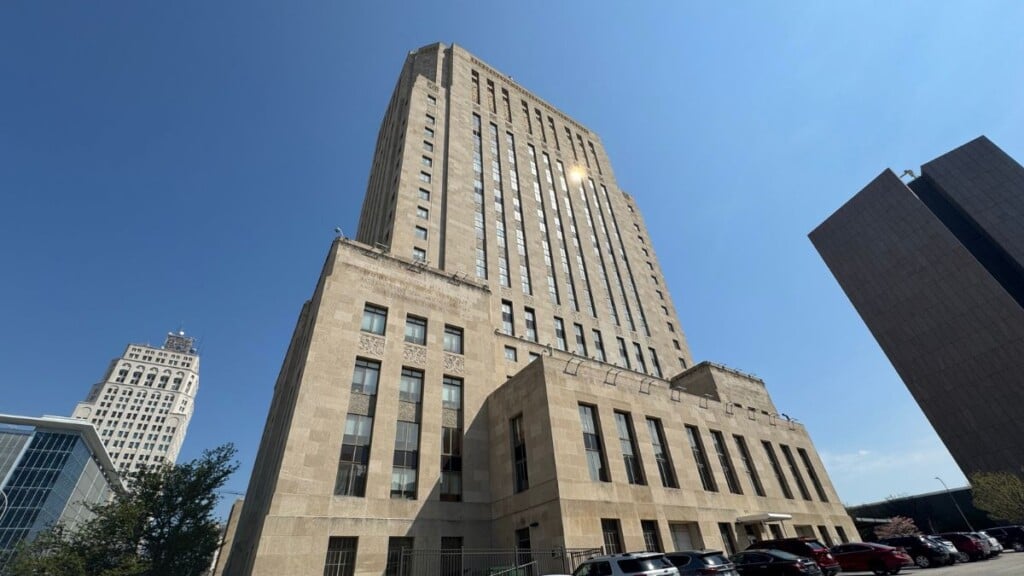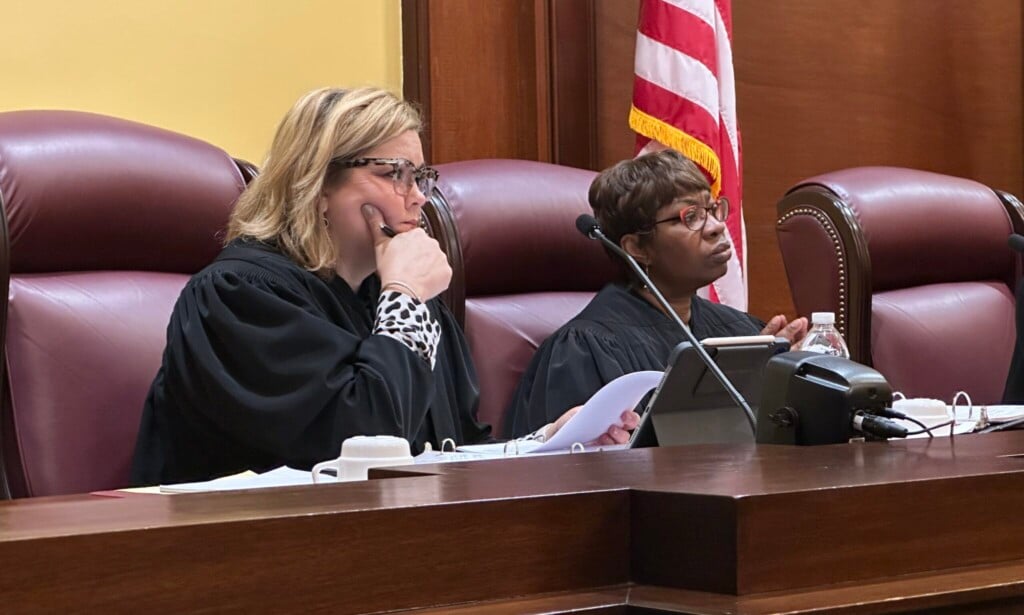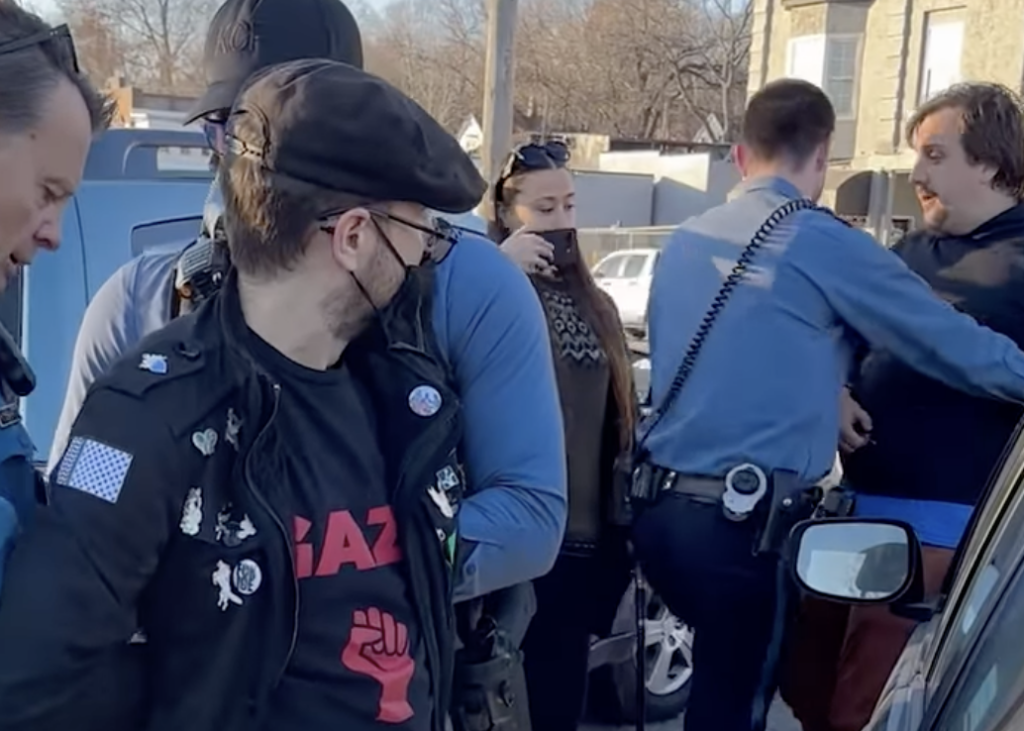Sunrise Movement KC expands rallies against incoming bus budget cuts
Over 60 people attended Sunrise Movement Kansas City’s mass meeting this past week to go over their long-term plan to organize, strike, and disrupt business as usual over the next four years of Trump’s presidency.
The Sunrise Movement is an organization of young individuals fighting to stop the climate crisis and win a Green New Deal. It started up in 2017 and made national headlines after conducting a sit-in with Alexandria Ocasio-Cortez in Nancy Pelosi’s office in 2018.
A major topic of discussion at the local meeting was the lack of bus routes out to cities like Lee’s Summit and Grandview.
Mahreen Ansari—a coordinator for the Better Buses Kansas City campaign—outlined the six demands the organization wants Jackson County to meet for RideKC:
- Every Kansas City resident will live within a 10 minute walking distance of a fast, frequent, and reliable bus line.
- Buses will come every 15 minutes and always be on time.
- Public mass transit will be powered by good, dignified, and unionized jobs.
- Zero fare forever.
- All buses will be electrified.
- All bus stops will be clean, accessible, and provide protection from the elements—with sidewalks, benches, and real-time transit information.
Ansari said she joined Sunrise KC in 2019 after seeing how people weren’t taking the climate crisis seriously.
“It was just amazing to see that there were Kansas Citians, across race and class, who cared about climate in the same way that I did,” she says. “In a way that did not leave our communities behind.”
Ansari was a full time bus rider until February of last year and grew up ‘anti-car.’ She lived in a transit desert in South KC and saw her neighbors struggle for accessible transportation.
“I moved to the historic Northeast and I got a job in Midtown. Riding a bus from the Northeast to Midtown was like a 45 minute to 15 minute ride, but it’s only a 15 minute drive via car,” Ansari says. “I was reminded again of how many parts of our city are so deeply disconnected from each other and disinvested when it comes to transit.”
The Sunrise KC chapter surveyed hundreds of residents on what their main struggles were—Finding bus routes was one of the most popular answers.
The chapter’s efforts were previously focused on pressuring city council and Mayor Quinton Lucas to make a better budget with Area Transport Agency, but organizers dealt with both sides blaming each other for the lack of funding for buses.
“Watching all of the service cuts happening in the surrounding cities and how it’s affecting Kansas Citians who work in those areas or go visit people in those areas, we decided that a county fight might make more sense,” Ansari says. “Last month, we pivoted to focusing on pressuring the county for long-term and sustainable funding.”
The organization has been asking Jackson County legislators for a meeting to negotiate but has not received any reply so far.
“We are planning on doing more things to show them that we’re not going to give up,” Ansari says. “We’re going to continue applying pressure until they will decide to fund buses in the same way that they were willing to fund a baseball stadium that people didn’t want.”
Kashmere Ketterman—another Sunrise Movement organizer—says he joined the group after his mom kicked him out of the house in 2020 and he lived in his car.
“I just felt hopeless. And, scrolling on social media one day, I saw these young people in Nancy Pelosi’s office from a few years ago,” he says. “I was like, ‘This is inspiring. Like, this looks like a movement that I see myself being a part of.’”
Ketterman ended up moving from Wichita and joining the KC chapter two years later.
“I keep coming back because I just see the state of our world,” he says. “I see a genocide being committed with our tax dollars across the world, and I see our so-called leaders who are supposed to be representing us, actually selling us out and harming us—And that might not be viewed as a form of violence, but it very much is.”
Ketterman lost his car over a year ago and has been dependent on buses and rides from friends. Behind rent, owning a car is the most expensive bill for families, he says.
“This bus campaign has never been more relevant than now because, like Mahreen said earlier, mobility is a human right,” Ketterman adds. “And, in my view, if you don’t have mobility, you’re not able to access your other rights.”
He explained that if the legislature doesn’t act, members of the metro will experience service cuts in RideKC buses early next year.
Ketterman says that county officials face one question: Are you going to do the right thing?
“Are you gonna stand by the 1000-plus people that signed our better buses for KC petition that we delivered to council? In the budget season, are they gonna listen to us and do the right thing, or are they gonna be self-serving?” Ketterman asks.
Anthony Cunningham—another transit-dependent resident—says he joined Sunrise KC to meet neighbors and feel more connected.
Cunningham made the decision to go car-free five years ago, due to his financial situation. Now, he’s able to pay off his student loans.
“There’s so much on the table, that the region as a whole just does not choose to participate or invest in,” Cunningham says. “If you look, for instance, across the state, to our sister city in St. Louis, how they fund public transit is they fund it both at the county as well as the city level, wherein Kansas City, there’s literally no money getting spent, at least on the Missouri side, from the county levels of governments.”
He also compared Jackson County to Wyandotte and Johnson County, where bus funding comes out of the general fund and doesn’t compete with other funds for police officers, teachers, or other services.
“They’re talking about cutting public transportation—one of the core and fundamental public services that any city of our size is expected to have,” Cunningham adds. “Especially one who’s going to be hosting the World Cup in less than two years.”
Folks don’t have to become car-burdened to meet their daily needs, he says.
“I’m very excited to play my role and tell my story to our elected officials directly, and get other folks to do the same.”








